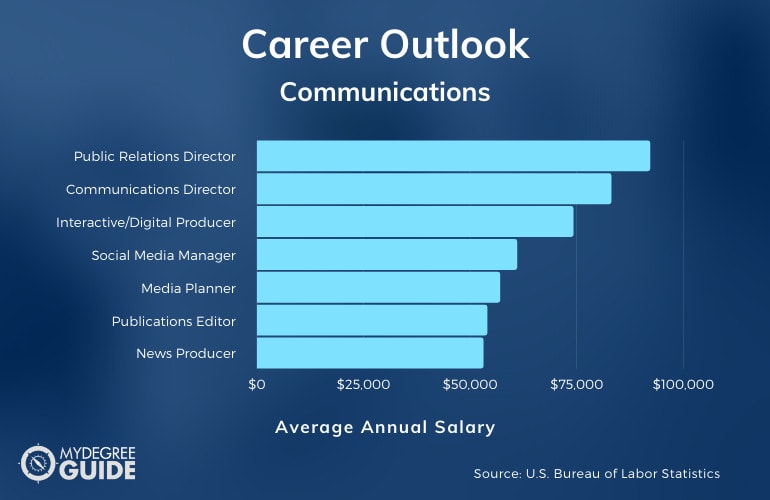A communications degree can be an excellent choice if you’re looking for a way to play a key role in the way corporations and organizations communicate with the public.
Is a Communications Degree Worth It?
Yes, a communication degree is worth it for many students. Media and communication jobs are projected to grow at a rate of 4% in the next 10 years (Bureau of Labor Statistics). Common careers in this field include film and video editors, announcers, public relations, news reporters, and authors.
Communications majors have a wide-range of exciting and interesting jobs open to them.
A communications degree can be a great fit for someone who is interested in working in media or broadcasting. However, you don’t necessarily have to be someone who is strictly interested in a glamorous career to major in communications.
Compare specializations like film, journalism, or public relations: 50 Best Online Communications Degrees for 2021
Communications experts are needed right where you live today. You can use your passion for bringing big, bright ideas to the forefront to help communities.
Is Communications a Good Major?

Communications is one of the most interesting and versatile majors out there. What you may find interesting once you dive in is the way a communications program overlaps with so many other majors. In fact, you can obtain a “hybrid” set of skills that straddles the worlds of business, psychology, and journalism.
One of the big advantages of an on-campus or online communications degree is that graduates often get recruited to work for companies in really exciting industries. Media outlets and public relations firms are peppered with communications majors.
Additionally, major corporations and organizations need communications experts to handle both internal and external communications.
What Do You Learn in a Communications Program?

A communications program has a little bit of “everything” because communications experts are involved in so many different roles in professional settings.
Here’s a sampling of just some of the courses you might expect to take:
- Communication Theory
- Creating Writing
- Marketing
- Mass Communications
- News Writing and Reporting
- Political Science
- Public Speaking
- Speech Writing
- Television and Media Broadcasting
The big thing a communications major can help you walk away with is the ability to craft a message that resonates and informs. One exciting thing about today’s programs is that they often integrate all of the mediums that are possible for effectively communicating a message. This covers everything from video to social media.
Should I Major in Communications or Marketing?

Many people with great communication skills and creativity find themselves feeling torn between majoring in communications and marketing. While not interchangeable, the two majors do have some overlaps. Let’s break down the similarities and differences.
Similarities
- Focus on written, visual, and verbal communication
- Emphasis on crafting messages
- Room for creativity
- Strong ties to business
Differences
- Marketing typically requires more work with data than communications
- Communications isn’t always focused on “selling” the way marketing is
- Communications can be internal instead of external
The fact that communications and marketing aren’t interchangeable doesn’t mean that graduates of these program can’t leap into flexible roles. The fact that you haven’t graduated with a degree in marketing won’t necessarily disqualify you from making the leap toward a more marketing-oriented role.
Many of the data-focused skills used at marketing firms can be learned “on the job” once you get in the door. A strong GPA and internship at a marketing-based company could be enough to help you land a job in marketing after putting your focus on studying communications.
This is especially true if you’re more interested in the “creative” side of marketing.
Are Communications Degrees Worth Anything in the Job Market?

Yes, a communications degree is something that can open big doors in the job market. Job availability for media and communication occupations is expected to grow about 4 percent in the next decade. That’s about the same pace as the overall job market.
One of the things really giving life to the communications field right now is the explosion of new media platforms and outlets. Brands need people who know how to create, disseminate, and edit media and messages across platforms more than ever.
What is especially exciting for new graduates with communications degrees is that they can choose to work for traditional organizations or jump to emerging platforms that are doing very innovative work.
What Kind of Jobs Can You Get With a Communications Degree?

Job options for graduates with communications degrees aren’t limitless. However, it can feel that way once you begin researching all of the different roles that are available across so many different industries.
Someone who majors in computer science can be pretty sure that they are likely to end up working at a tech firm or software company. However, the story is a little different for a communications major.
As a communications major, you could actually end up at a tech firm or software company within a communications or marketing department. You might also work for a movie studio, news agency, manufacturing firm, hospital, college, or government agency.
These are only just a few examples of what you can do with a communications degree, and it should be known that very few majors offer so much range!
Entry Level Jobs You Can Get With a Communications Degree

What kind of job can you expect to get as a new communications graduate? Most new graduates land support roles. This can include roles like a communications associate, public relations assistant, editorial assistant, associate brand manager, or customer communications specialist.
It may seem overwhelming to decide the specialty you want to focus on when applying for your first job out of college. After all, this is a major with lots of room to branch out into some very specific career paths. This is one of the reasons why so many communications majors seek out exciting internships.
You might say that communications majors often land the most enviable internship positions around! That’s because many spend their summers or semesters working at news stations, magazines, marketing firms, movie studios, or production companies.
It’s not uncommon for interns to work closely with well-known television or media personalities while learning essential skills.
Of course, the connections earned during an internship at a high-profile company can be priceless for someone looking to get into media!
How Much Can You Make With a Communications Degree?

It’s important to have a realistic perspective regarding earning potential for a communications degree. Of course, salary prospects are a bit skewed due to the fact that many high-profile media personalities like Oprah Winfrey just happen to be communications majors.
According to the Bureau of Labor Statistics, some careers in the communications field include:
| Careers | Annual Median Salary |
| Communications Director | $134,790 |
| Public Relations Manager | $118,430 |
| Interactive/Digital Producer | $95,260 |
| News Producer | $65,720 |
| Social Media Specialist | $64,880 |
| Publications Editor | $63,400 |
| Publicist | $62,810 |
| School Publicity Writer | $59,360 |
| News Anchor | $55,030 |
People who get into major corporations or media entities tend to climb to salary thresholds that are well above average. Of course, the possibility of working in an on-air capacity can open up some very exciting doors for communications majors!
Further Education – How to Move Up in Communications
You may decide that you’d like to earn a master’s degree once you begin your career. This can be a great move if your goal is to reach an executive or supervisory role.
There are actually two good options for people in the communications field seeking advanced degrees. The first is a Master’s in Communications. The second is a Master of Business Administration (MBA).
Leave a Reply